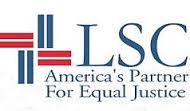Legal Services Corporation Leaders Confident of Bipartisan Support in Wake of Defunding Proposal
February 12, 2018
President Trump’s budget proposal for Fiscal Year 2019 released today calls for defunding the Legal Services Corporation (LSC), but LSC leaders remain confident of continued bipartisan Congressional support.
LSC is the nation’s largest single funder of civil legal aid, distributing more than 94% of its funding to more than 800 offices nationwide. These organizations serve low-income individuals, children, families, seniors, and veterans in every congressional district.
Last year, the Trump Administration also identified LSC as one of 19 independent agencies to be eliminated. In response, members of the legal community, business leaders, state attorneys general, and state legislators from across the country sent letters to the House and Senate Appropriations Committees advocating robust support for LSC. Congress passed a series of Continuing Resolutions maintaining LSC’s funding at the Fiscal Year 2017 level, $385 million.
“I am optimistic that Congress will continue to fund LSC,” said LSC President Jim Sandman, “because LSC promotes the most fundamental of American values—equal justice under law. Both the House and the Senate Appropriations Committee voted to continue to fund LSC after the Administration’s proposal to eliminate LSC last year, and just last week Congress voted to give LSC an additional $15 million to fund legal services for victims of recent natural disasters. LSC has had broad bipartisan support on Capitol Hill for more than 40 years. And we have it now.”
LSC asked Congress today for $564.8 million for Fiscal Year 2019 to help meet the overwhelming need for civil legal services. This budget request reflects an increase of $37 million over last year’s request of $527.8 million. The increase would be allocated entirely to basic field grants that fund the essential, day-to-day operations in 133 civil legal aid organizations across the country.
“For more than 40 years, the Legal Services Corporation has promoted a core American value—equal access to justice,” said LSC Board Chair John Levi. “Our grantees in every congressional district across the country provide services to low-income Americans that go to the heart of their security and well-being—survivors of domestic violence seeking protections from their abusers, victims of natural disasters trying to obtain appropriate relief, veterans collecting benefits they have earned, the elderly protecting their assets from scams, and so much more. With more money available for domestic spending in the budget deal reached last week, we call on Congress to significantly increase LSC’s funding.”
Civil legal aid offices provide critical constituent services. In 2016, LSC grantees helped nearly 1.8 million people in all households served.
The enormous gap between the number of people who need these critical legal services and the resources available to meet them was documented last year in LSC’s The Justice Gap—Measuring the Unmet Civil Legal Needs of Low-Income Americans. The report, prepared in conjunction with NORC at the University of Chicago, found a wide justice gap for the approximately 20 percent of Americans eligible for LSC-funded assistance. Eighty-six percent of the civil legal problems faced by this population in a given year receive inadequate or no legal help. And the need is widespread, with 71 percent of low-income households experiencing at least one civil legal problem a year, and a quarter of this population experiencing six or more civil legal problems.
Civil legal aid is a good investment for communities as well as for individuals. Studies in several states illustrate that legal aid reduces homeless shelter costs, foreclosure and eviction rates, and domestic abuse costs, while increasing employment. The federal contribution to civil legal aid allows millions of Americans to safeguard their basic legal rights.
